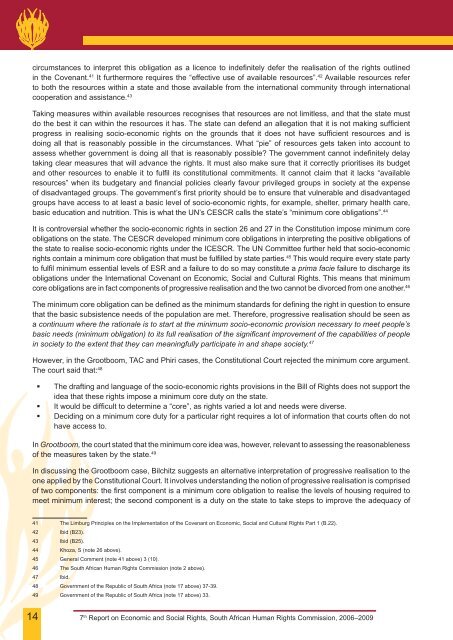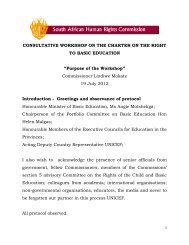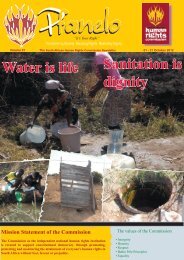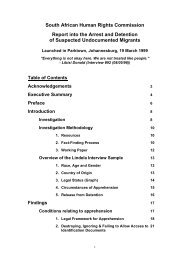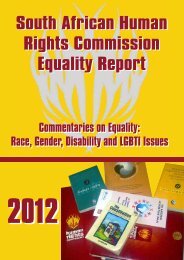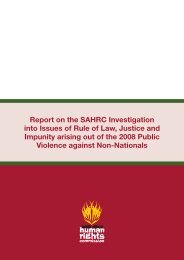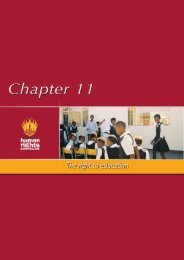Chapter 1 - South African Human Rights Commission
Chapter 1 - South African Human Rights Commission
Chapter 1 - South African Human Rights Commission
- No tags were found...
Create successful ePaper yourself
Turn your PDF publications into a flip-book with our unique Google optimized e-Paper software.
circumstances to interpret this obligation as a licence to inde nitely defer the realisation of the rights outlined<br />
in the Covenant. 41 It furthermore requires the “effective use of available resources”. 42 Available resources refer<br />
to both the resources within a state and those available from the international community through international<br />
cooperation and assistance. 43<br />
Taking measures within available resources recognises that resources are not limitless, and that the state must<br />
do the best it can within the resources it has. The state can defend an allegation that it is not making suf cient<br />
progress in realising socio-economic rights on the grounds that it does not have suf cient resources and is<br />
doing all that is reasonably possible in the circumstances. What “pie” of resources gets taken into account to<br />
assess whether government is doing all that is reasonably possible? The government cannot inde nitely delay<br />
taking clear measures that will advance the rights. It must also make sure that it correctly prioritises its budget<br />
and other resources to enable it to ful l its constitutional commitments. It cannot claim that it lacks “available<br />
resources” when its budgetary and nancial policies clearly favour privileged groups in society at the expense<br />
of disadvantaged groups. The government’s rst priority should be to ensure that vulnerable and disadvantaged<br />
groups have access to at least a basic level of socio-economic rights, for example, shelter, primary health care,<br />
basic education and nutrition. This is what the UN’s CESCR calls the state’s “minimum core obligations”. 44<br />
It is controversial whether the socio-economic rights in section 26 and 27 in the Constitution impose minimum core<br />
obligations on the state. The CESCR developed minimum core obligations in interpreting the positive obligations of<br />
the state to realise socio-economic rights under the ICESCR. The UN Committee further held that socio-economic<br />
rights contain a minimum core obligation that must be fullled by state parties. 45 This would require every state party<br />
to full minimum essential levels of ESR and a failure to do so may constitute a prima facie failure to discharge its<br />
obligations under the International Covenant on Economic, Social and Cultural <strong>Rights</strong>. This means that minimum<br />
core obligations are in fact components of progressive realisation and the two cannot be divorced from one another. 46<br />
The minimum core obligation can be dened as the minimum standards for de ning the right in question to ensure<br />
that the basic subsistence needs of the population are met. Therefore, progressive realisation should be seen as<br />
a continuum where the rationale is to start at the minimum socio-economic provision necessary to meet people’s<br />
basic needs (minimum obligation) to its full realisation of the signi cant improvement of the capabilities of people<br />
in society to the extent that they can meaningfully participate in and shape society. 47<br />
However, in the Grootboom, TAC and Phiri cases, the Constitutional Court rejected the minimum core argument.<br />
The court said that: 48<br />
• The drafting and language of the socio-economic rights provisions in the Bill of <strong>Rights</strong> does not support the<br />
idea that these rights impose a minimum core duty on the state.<br />
• It would be difcult to determine a “core”, as rights varied a lot and needs were diverse.<br />
• Deciding on a minimum core duty for a particular right requires a lot of information that courts often do not<br />
have access to.<br />
In Grootboom, the court stated that the minimum core idea was, however, relevant to assessing the reasonableness<br />
of the measures taken by the state. 49<br />
In discussing the Grootboom case, Bilchitz suggests an alternative interpretation of progressive realisation to the<br />
one applied by the Constitutional Court. It involves understanding the notion of progressive realisation is comprised<br />
of two components: the rst component is a minimum core obligation to realise the levels of housing required to<br />
meet minimum interest; the second component is a duty on the state to take steps to improve the adequacy of<br />
41 The Limburg Principles on the Implementation of the Covenant on Economic, Social and Cultural <strong>Rights</strong> Part 1 (B.22).<br />
42 Ibid (B23).<br />
43 Ibid (B25).<br />
44 Khoza, S (note 26 above).<br />
45 General Comment (note 41 above) 3 (10).<br />
46 The <strong>South</strong> <strong>African</strong> <strong>Human</strong> <strong>Rights</strong> <strong>Commission</strong> (note 2 above).<br />
47 Ibid.<br />
48 Government of the Republic of <strong>South</strong> Africa (note 17 above) 37-39.<br />
49 Government of the Republic of <strong>South</strong> Africa (note 17 above) 33.<br />
14<br />
7 th Report on Economic and Social <strong>Rights</strong>, <strong>South</strong> <strong>African</strong> <strong>Human</strong> <strong>Rights</strong> <strong>Commission</strong>, 2006–2009


